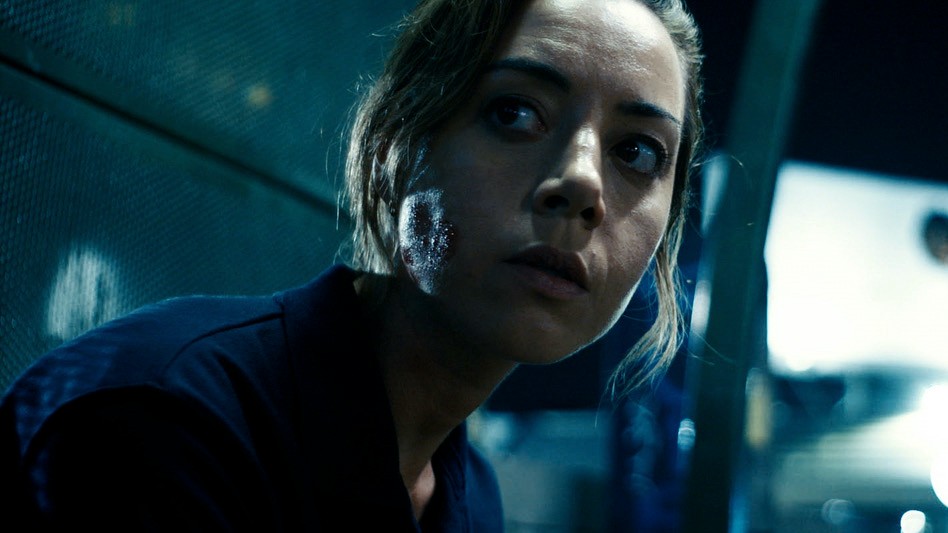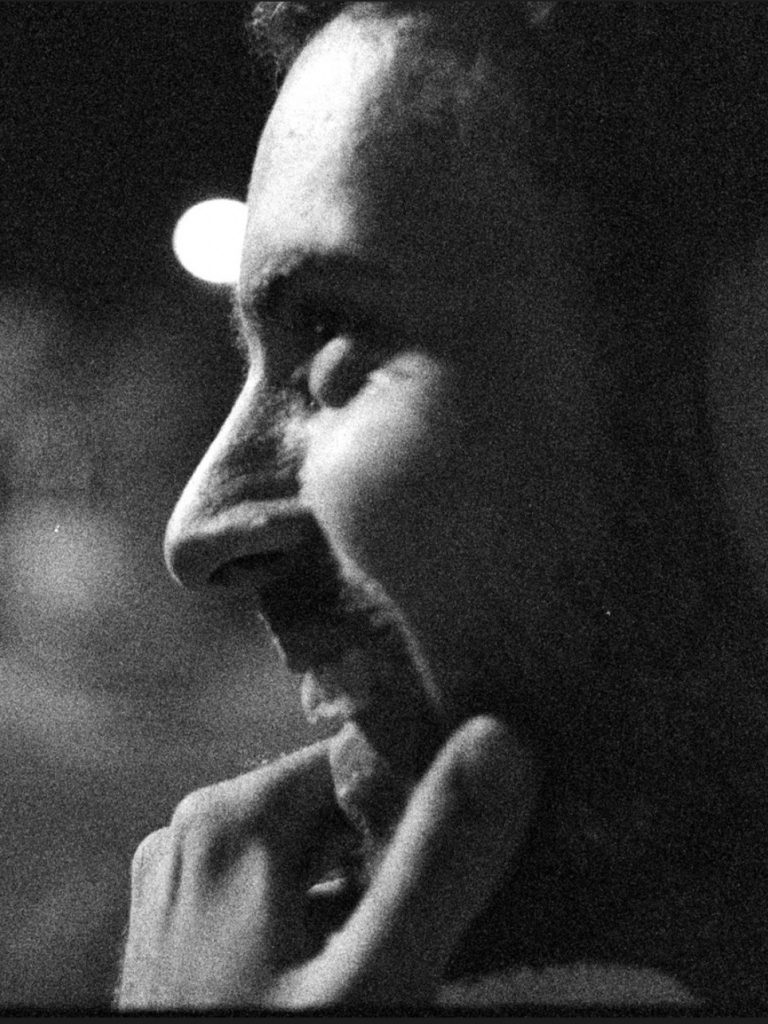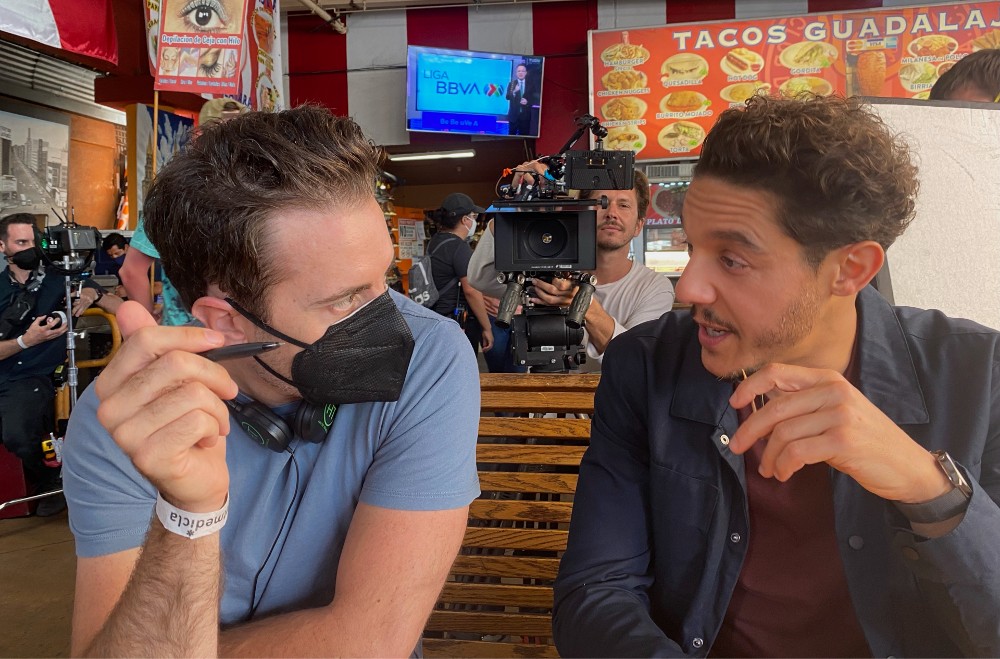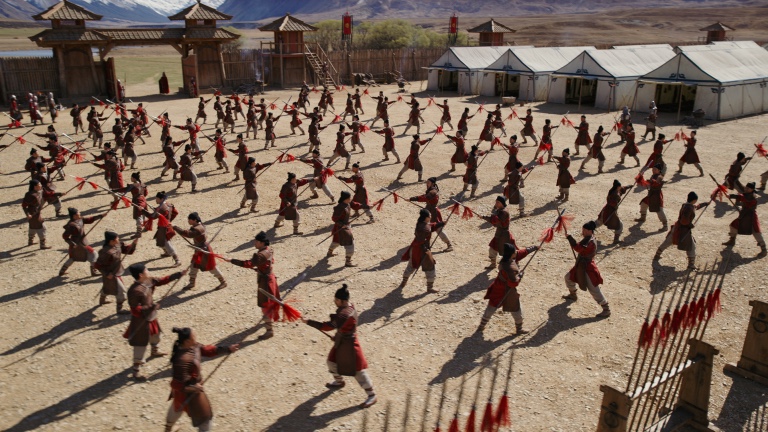
The Sundance Film Festival frequently boasts exciting new discoveries, including many filmmakers who go on to make much bigger movies and enjoy long, fruitful careers. From Rian Johnson (Brick) to Ryan Coogler (Fruitvale Station), the list is long.
John Patton Ford came to Sundance this year with his own feature directorial debut, Emily the Criminal, and left Park City as both a rising star in Hollywood and the rare festival filmmaker with a theatrical distribution deal.
Emily the Criminal stars Sundance regular Aubrey Plaza — who also served as a producer — as the title character, a desperate young woman struggling to get out from under a mountain of debt, who is convinced to take part in acts of credit card fraud that become more dangerous as she burrows deeper into the world of crime. In doing so, she meets Youcef (Theo Rossi), a kind member of the criminal operation Emily is a part of, who bonds with her and eventually helps her plot an escape from their unforgiving lifestyle.
Ford’s debut is a kinetic, fast-paced crime-thriller that takes us into a world that most of us, thankfully, have never seen up close. Between Ford’s crackling writing and Plaza’s performance, Emily the Criminal emerged from Sundance as one of the festival’s most popular titles.
Below the Line spoke with Ford over Zoom last week about what went into making such a distinctive and original crime-thriller on a fairly low budget — despite shooting in Los Angeles during a pandemic, no less.

Below the Line: I know you made a short maybe 12 years ago, but what led you to start on this feature and get Aubrey Plaza involved?
John Patton Ford: For me, it’s been a long, long, journey to making my first feature film. Every day of my life since that short movie, I’ve been trying, and it just took this long to get that money and to get it all together.
I first started getting this project together back in 2017. I wrote a draft, and it felt like something that I could tell, something that I had the authenticity to tell. I kind of knew how the central character felt, and I come from similar frustrations and anxieties. But then, with Aubrey, I think I completed a draft and then she got a hold of it in summer of 2018, and I met her at a coffee shop. It’s just kind of a friend of a friend thing. I’d given the script to a friend for notes, and then that friend knew Aubrey and passed it on to her. And that’s how it happened.
From that point, it was off to the races. From that point, it was like we were doing this together, and we were gonna find a way. And thank God it happened.
BTL: Was this before COVID or had the pandemic already hit when you were ready to go into production?
Ford: I met Aubrey… we started on this journey long before COVID, but we shot last summer, which was summer 2021, so that was during COVID, and we had to shoot with protocols. We had to shoot with the fear of getting a positive test, which means we’d have to shut down. It was very much its own thing. Shooting a movie during COVID was just like, “Here’s an added layer of more crap you gotta worry about.”
BTL: While also making your first movie…
Ford: You already have this multi-decker cake that’s insane, and then, “Oh, yeah, here. We’re gonna throw on some of that pandemic on top. There you go, buddy. Deal with that.” That’s how it felt, and it was like, “Alright, what else you got?”
BTL: Are you based in LA yourself?
Ford: Yeah. I’m from South Carolina originally, but I went to grad school a long time ago, and here is where I am.
BTL: And the plan was always to film everything in L.A.? I mean, I assume it was all L.A.
Ford: I really wanted it to be here, I felt like there’s something specific to this place, and if it weren’t here, it might not totally make sense. It has to be in a place that has a really high cost of living. It has to be someplace that’s sort of aspirational, where you’re there because of hopes and dreams that you have. I wanted the character to be in that world. I wanted us to know, just on arrival, “Oh, she’s come here with a dream of some kind that didn’t work out, and now her life is expensive.” Those things work in L.A., but they might not work in some other place.
BTL: You’d be surprised. I’m actually wondering if anyone might see this movie and think, “Hey, this might be a way to make money,” although the film sends a clear warning that it’s not a good idea.
Ford: I hope that no one sees this and commits credit card fraud, but I’m sure there will be those people out there somewhere.

BTL: Did you do a lot of research into credit card fraud or did you know people who had been involved with it to use for research?
Ford: It sounds weird, but there are actually a lot of YouTube videos that tell you how to commit credit card fraud. At the risk of getting put on an FBI watch list, I watched a lot of these videos, and I also spoke to a handful of people who I can’t name, and I got a lot of details, a lot of granular, specific, interesting stuff, and that’s what you want. You want stuff that’s really, really specific that feels so strange that it must be real. That’s what I was looking for, and that’s what we got.
BTL: Most people know about the phishing scams to get credit card info, but I’m not sure we know what happens to that info and how it’s used until we watch something like Emily the Criminal.
Ford: It’s just a whole thing. It’s a whole world unto itself, and it’s fascinating.
BTL: As someone directing their first feature, how do you go about putting together your team, particularly your department heads? Was it just a lot of interviews and watching people’s other movies?
Ford: All the above. Luckily, I went to film school, so I’m still close with so many of the people I went to school with, so I could draw upon that, and I can dip into that bucket. But then we just went through a ton of people, trying to figure out just the right production designer to get and just the right wardrobe person to get and just the right composer [read our interview with Nathan Halpern] to get, just the right editor.
You just have to kind of do the legwork and interview a lot of people and consider a lot of people until you find the right ones. I think finding your collaborators is a lot like casting actors, but you’re casting a production designer. We were determined to find just the right people, and it came out okay.
BTL: Since this is presumably a lower-budget movie, I imagine you shot a lot of it on location, dressing things up as needed rather than doing anything on sound stages. How did you work with the location manager and production designer to find places that worked?
Ford: We just had a drive around L.A., going to a lot of sketchy places. That’s the short story. There was nothing on stage, and it was all real locations, a lot of real people who didn’t even know they were in a movie, to be honest with you. We were shooting in locations where we couldn’t shut it down, and people were just walking around, and we were there shooting. It’s kind of hard to draw the line between where, like, real life was ending and the movie was beginning, but I’ll tell you this, the movie was initially slated to shoot two years ago in the summer of 2020, and COVID happened, and we kept getting pushed back.
During that time, I just started looking at locations, so by the time the movie shot, I had been location scouting effectively for about a year. Typically, you’re only location scouting for a couple [of] weeks, and you end up just signing off on some location that’s not perfect, but you’re like, ‘This is the best it’s gonna be.’ Whereas [with] this, I got to find the ultimate places, because I had so much time to do it during COVID. It was a weird privilege. It’s a weird silver lining in the cloud of getting pushed back.
BTL: Did you have a set decorator who was adding things and changing up the locations you found, or was there not enough time to do that once you found a place?
Ford: Of course. We had a full art department and production designer. All of those spaces that you see were dressed completely to look the way that they are. We didn’t just show up. Every single thing was constructed, and I don’t know how that person did that. So Liz Tunkel was our production designer, and she was just incredibly resourceful and scrappy and committed to making the movie feel like it wasn’t designed.
She wanted it to look like this was what the places were [like] when we showed up. That was her goal, was to make it look like it hadn’t been designed, and she just achieved that so well. She’s just so resourceful, and fun fact, Liz also did the production design of Marcel the Shell. She’s the person who did all that adorable miniature furniture, and also the production design for the gritty disgusting-ness of Emily the Criminal. If that doesn’t show range, I don’t know what does.
BTL: Aubrey is great in this film, but can you talk about her as a producer and how she worked alongside you to help get this thing off the ground?
Ford: She’s a wonderful collaborator, just the absolute best, man. She really, really cares. She really wants to make something good. She has incredible tastes and is selfless. I think there’s a confluence of actors who, first and foremost, are thinking about their careers, and how they can leverage this for themselves somehow. Aubrey [just] wants to make a really good movie. She wants the whole movie to be good, and that’s what she’s thinking about. That’s where she starts. The fact that she’s acting in it, and she’s performing, is, like, just part of it. The place where she starts is, ‘How can I serve this entire movie? How can I uplift the whole thing?’ In that sense, it’s great.
She’s also just tough, man. She just doesn’t give up on things. She wants things to be a certain way and just fights and keeps fighting for it. It kind of sets a certain standard. You see her behaving that way, and you think, ‘Well, I have to behave the same. I have to work just as hard, and I have to be just as uncompromising or else, like, I’ll just feel pathetic by comparison.’ Yeah, she’s a terrific collaborator, man. I can’t say enough.

BTL: I want to ask about Theo Rossi. He’s amazing in this movie, and since seeing this at Sundance, I’ve noticed him doing great stuff in a few other movies. This is just a fantastic role for him, so what was involved with finding him for that really important second lead?
Ford: Just casting agents, man. We needed somebody, and we couldn’t find anybody — we were down to the wire; I think we were 10 days away from shooting. Think of the difficulties of the role, think of how narrow the criteria are for the role. You have to be of Middle Eastern descent, you have to speak Arabic as one of your first languages. You have to be available and right for the role and vibe with Aubrey. It was just impossible to find the person, and he just came out of nowhere.
The thing that strikes me about Theo is his humanity. You feel like beneath the tough guy, or the cool guy, or beneath those things, there’s someone who’s just really sensitive and trying to do the right thing, and it was that quality that I really latched on to and thought, ‘Okay, that’s great for us — let’s lean into that.’ You can see the guy’s heart, and he has such a heart. So that’s the Theo story.
BTL: And then, he had 10 days to learn the script after coming on board, right? Or was it even less than 10 days?
Ford: He had no time whatsoever. Really, I didn’t know Theo at all until we started shooting and suddenly, we were there, and we were doing it and figuring it out on the fly. Luckily, he’s just an incredible talent. He’s such a professional actor, and he just figures everything out, and then he executes. [He’s a] total beast.
BTL: How long did the shoot last?
Ford: I think it was 21 days total. I can’t even tell you how absolutely suicidal that is, for a movie like this. It was unbelievable, the amount of stuff we had to accomplish in such a short period of time. We had 20 days here in LA and then one day in Mexico, in Puerto Vallarta. Somehow, we got it done, but I think I’m only now recovering. I think it took five years off my life, man, honestly. This movie did me in. [laughs]
BTL: But having four years to prepare, that must have given you time to work with your DP and do shot lists and maybe even storyboard, no? Or was it more run-and-gun, just by the nature of it?
Ford: I mean, we were prepared, and we did a shot list, and we knew what we were doing. I think the nature of having so little time and so little money is that unpredictable stuff just happens. You find yourself pivoting and replanting on the fly. You get to set in the morning, and you got all your shots worked out, and you know what you’re gonna do, but then something pops up and something changes, and you need to rethink everything.
There were multiple days where just everything went out the window, and we had to make it work with what we had. I think that’s just making a movie. It’s like making art on a bumper car. As long as you know what the heart of the story is about, you can kind of pivot around that and improvise, but you’re never gonna do it the way you thought you were gonna do it.
BTL: I was really impressed by the car chase, I spoke to a couple of camera operators who worked on Michael Bay’s Ambulance, and he shut down 10 blocks of L.A. for a week, obviously not something you were able to do for that short car chase. But what was involved in pulling it off?
Ford: Oh, my God, that was the most insane thing. We shot all of that in four hours. We couldn’t afford to shut down the street, so we did something called “intermittent lockup,” which is when you get a police officer to stand at an intersection, and then, for a brief period of time, like five minutes, prevent all traffic from coming through. For those five minutes, you have free rein to the street, then the cops gotta let traffic through, and so, it’s like game-on, game-off. That’s what it was.
We were cramming in every shot we could possibly get within that narrow timeframe, and it’s not just a car chase. The character is bleeding increasingly over the course of the chase, so there’s a makeup angle to it. ‘Oh, in this shot, she’s got to have a bit of blood, but then five seconds later, she needs more blood.’ And then, she gets out of the car and gets back into the car. I can’t believe we pulled that off. It was an absolute sprint, and none of us caught our breath, non-stop, for the entire day. It was insane.

BTL: It sounds really crazy and stressful, but also, I think, it gave an urgency to the movie that was used well and you can see it on screen in a good way.
Ford: You’re totally correct. The making of the movie felt an awful lot like the movie. It was thrilling and stressful and crazy. When I watch the movie, it’s like a documentary about us making the movie. [laughs]
BTL: It also must have been a super-fast post. If you brought the movie to Sundance in January 2022 and you shot it in the summer of 2021, that’s a really fast turnaround for a first feature. Or even a third or fourth feature, and to pull that off with all the COVID stuff on top of it…
Ford: Yeah, I dunno. We just had to. I had been envisioning the movie for a long time, so I kind of knew how it was gonna go. I knew how it was gonna cut together, but also, we had an incredible editor who is just an absolute bananas genius, this guy named Harrison Atkins, who never broke a sweat. He was never troubled by editing or even frustrated. This was so easy for him. He just like cut through it, almost like it was a hobby. It was like he was doing it part-time, so I gotta credit him. He really cut the whole movie in five or six weeks and had it pretty much wrapped up. I don’t know what kind of mind you gotta be born with to pull that off, but I still can’t believe it. He’s just good.
BTL: Were you able to work in the same room with your editor, which was one of the limitations that COVID created for many filmmakers?
Ford: We were together all day, every day. He lives in my neighborhood, so I’d just ride my bike over [to] his house and start cutting the movie. And then, every now and then he’d be like, ‘I need you to leave, please,’ and I’d say, ‘Okay,’ and then I’m alone for a couple [of] days, and then come back. I remember at one point, he went to Europe, he went to Norway, which is where his girlfriend lives. He was like, ‘I really want to go see my girlfriend.’ I was like, ‘Just go and just take the hard drive and just go cut it there for two weeks, and I won’t see it and then come back, and I’ll be fresh, and we’ll start again.’ This was like, in September, and the movie’s due in October, so it was nerve-wracking, but it all worked out in the end.
BTL: You mentioned the music earlier, and I did want to ask about that because your movie really has a terrific score, so how did you find someone to give it just the right feeling music?
Ford: He’s a wonderful gentleman named Nathan Halpern. You probably know who he is. He is Chloé Zhao‘s composer. I shouldn’t say that. He’s worked for all sorts of people and not just her, but he’s a throwback to this different era. He’s a real composer, and he knows music theory, and he can compose for an orchestra and has an inexhaustible knowledge of music. He’s the real deal, he’s not just a guy poking around on a synthesizer and making sounds — he’s a real musician. [He] just brought a level of professionalism to this that is just so cool. I put him through it, for sure. I’m a hard person to please in terms of music. I studied music as an undergrad, that’s where I came from, so I’m tough. [laughs] I was hard on him, but he’s just really smart, and his instincts are almost always right. So, good guy to know.
Emily the Criminal is now playing in theaters nationwide courtesy of Roadside Attractions and Vertical Entertainment.





